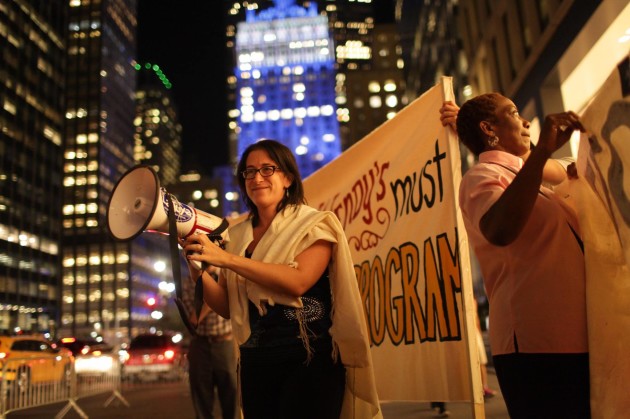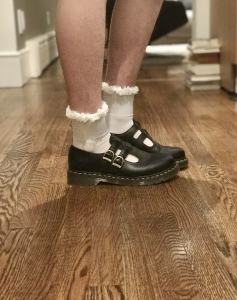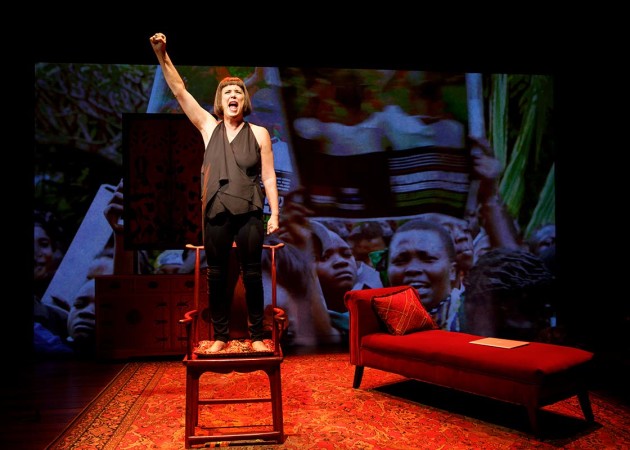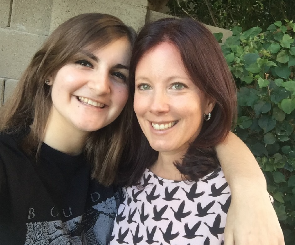The Lilith Blog
February 22, 2018 by Eleanor J. Bader
Meet a “Tomato Rabbi” Fasting Against Sexual Harassment

Rabbi Rachel Kahn-Troster holds a megaphone while protesting Wendy’s.
Six-and- a-half years ago, in fall 2011, a group of 17 rabbis traveled to Immokalee, Florida, to meet with the women and men who work in the area’s tomato fields and hear, first-hand, about their ongoing campaign to win justice and respect from the growers who employ them. Since then, 10 delegations—of rabbis, cantors, and lay religious leaders—have visited Immokalee. The trips were sponsored by T’ruah: The Rabbinic Call for Human Rights and participants have become staunch supporters of efforts by the Coalition of Immokalee Workers’ to improve wages and end the sexual exploitation and harassment of female farmworkers.
Rabbi Rachel Kahn-Troster, Director of Programs at T’ruah and a longtime supporter of the CIW, spoke to Eleanor J. Bader about the Coalition’s upcoming “Freedom Fast;” her decision to participate in the five-day, liquids-only, hunger strike; and the Jewish imperative to support human rights.
- No Comments
February 21, 2018 by Eleanor J. Bader
Why Dozens Are Fasting To Get Wendy’s To Address Sexual Harassment
 From March 11th to 15th, Lupe Gonzalo, a leader of the Coalition of Immokalee Workers, will be on a liquids-only “Freedom Fast.” The goal? To pressure Wendy’s, the only major fast food restaurant chain to refuse to adopt regulations to protect farmworkers from sexual harassment, wage theft, and other unfair labor practices in the tomato fields of southwest Florida. Gonzalo will be joined by dozens of workers and their families, as well as allies from diverse religious and secular communities, all of them united in demanding respect for the workers who plant our crops and harvest our fruits and vegetables.
From March 11th to 15th, Lupe Gonzalo, a leader of the Coalition of Immokalee Workers, will be on a liquids-only “Freedom Fast.” The goal? To pressure Wendy’s, the only major fast food restaurant chain to refuse to adopt regulations to protect farmworkers from sexual harassment, wage theft, and other unfair labor practices in the tomato fields of southwest Florida. Gonzalo will be joined by dozens of workers and their families, as well as allies from diverse religious and secular communities, all of them united in demanding respect for the workers who plant our crops and harvest our fruits and vegetables.
The protest will take place at the Park Avenue office of Nelson Peltz, Wendy’s board chair and a founding partner of Trian Fund Management, a New York City-based investment fund. According to Forbes Magazine, the 74-year-old Peltz has a net worth of $1.51 billion; in addition to Wendy’s, he is at present on the boards of Proctor & Gamble, the Simon Wiesenthal Center, and Sysco Systems.
To date, he has refused to negotiate with—or even meet—members of the CIW or supporters of the organization.
Gonzalo recently spoke with Eleanor J. Bader about the CIW, the upcoming hunger strike, and the progress that has been made since the Coalition was founded in 1993.
Patricia Cipollitti, National Co-coordinator of the Alliance for Fair Food, a consumer group, provided Spanish-to-English translation for the 90-minute interview.
- No Comments
February 20, 2018 by Stacey McArthur
My Ex is Jewish. I’m Not. So Why Am I Raising My Children Jewish?
 Elijah looks like a small man in an oversized suit as the rabbi hands him the Torah. My son presses it against his chest and right shoulder. His 12-year-old arms aren’t long enough to wrap fully around this sacred book. He hugs it tightly as he steps off the bima toward the congregation.
Elijah looks like a small man in an oversized suit as the rabbi hands him the Torah. My son presses it against his chest and right shoulder. His 12-year-old arms aren’t long enough to wrap fully around this sacred book. He hugs it tightly as he steps off the bima toward the congregation.
My eyes follow my firstborn through the crowd. There’s a part of me that wonders on this chilly Saturday morning what we’re still doing here at this temple. I feel proud of this boy and also uneasy and alone as I witness him completing a path that jogs so far from mine. This coming-of-age ceremony solidifies that our religious paths will never meet.
- 5 Comments
February 19, 2018 by Sara Fredman
Is Midge Maisel a Bad Mom? A Feminist Query.
 In a recent essay, Rebecca Solnit recalls a Q&A section of a talk she once gave on Virginia Woolf during which the main preoccupation of her audience was the question of whether or not Woolf should have had children. She describes her frustration, writing that “After all, many people have children; only one made To the Lighthouse and The Waves, and we were discussing Woolf because of the books, not the babies.”
In a recent essay, Rebecca Solnit recalls a Q&A section of a talk she once gave on Virginia Woolf during which the main preoccupation of her audience was the question of whether or not Woolf should have had children. She describes her frustration, writing that “After all, many people have children; only one made To the Lighthouse and The Waves, and we were discussing Woolf because of the books, not the babies.”
I thought of that anecdote recently while reading a blog post criticizing the Golden Globe-winning show The Marvelous Mrs. Maisel for its depiction of the titular character’s approach to motherhood. [SPOILERS AHEAD.] The show follows Miriam “Midge” Maisel as her aspiring stand-up comedian husband unceremoniously leaves her, and as she comes to the realization that she’s actually the one in the relationship with the talent for comedy. The Marvelous Mrs. Maisel is reminiscent of that other mid-century period piece, Mad Men, not just because of the fashion and social mores, but because of a deliberately delayed reveal. Just as we only find out that Don Draper is married with children at the end of the first episode, we spend most of the first episode of The Marvelous Mrs. Maisel watching Midge and her husband cavorting downtown and returning to their Upper West Side classic six late at night; we only find out that they have children two-thirds of the way through. This is a harbinger of things to come because it turns out that Midge’s parents, who live in the same apartment building, frequently watch the children, often overnight. This enables Midge to, as blogger Jordana Horn points out, “have very, very little to do with her children.” That the children are mostly out of sight bothers Horn because “Midge’s happiness and sense of self seem to derive almost entirely from her escape from the expected roles of a 1950s housewife and mother.”
Because I am a nerd medievalist, Horn’s perplexity that a show about a woman who is a mother does not focus on her motherhood reminds me of modern reception of what many consider to be the first autobiography in the English language, The Book of Margery Kempe.
- 5 Comments
February 16, 2018 by Julie R. Sissman
Please Join Me in Sending a Gender Email!
 As I walked down the hallway of my daughter’s pre-school classroom, I heard a strange noise. “Clip-clop, clip-clop, clip-clop.” What was that noise coming from my daughter’s classroom? I looked in the door, thinking it would be a hand-made musical instrument or a child knocking blocks together in a certain rhythm. I was dismayed to look in the door and see the noisy culprit – high heeled shoes on the three-year old girls. The girls were walking slowly and gingerly around the classroom, trying not to fall because of the shoes. Clip-clop, clip-clop, clip-clop. The three-year old boys, in contrast, were moving around the room with ease and comfort.
As I walked down the hallway of my daughter’s pre-school classroom, I heard a strange noise. “Clip-clop, clip-clop, clip-clop.” What was that noise coming from my daughter’s classroom? I looked in the door, thinking it would be a hand-made musical instrument or a child knocking blocks together in a certain rhythm. I was dismayed to look in the door and see the noisy culprit – high heeled shoes on the three-year old girls. The girls were walking slowly and gingerly around the classroom, trying not to fall because of the shoes. Clip-clop, clip-clop, clip-clop. The three-year old boys, in contrast, were moving around the room with ease and comfort.
I was then motivated to write what I now call my “gender email.” I’ve sent it to the schools and camps that my daughters go to, asking them to think critically and intentionally about how gender plays through for students/campers.
- 1 Comment
February 15, 2018 by Jill Abramson
Wrestling with the Gender Politics in Mi Sheberach
One night as I was leaving the Westchester Reform Temple, the synagogue where I am a cantor, I received a frantic text message from a dear friend, who has a five-year-old son named Noah. “At Greenwich hospital,” the text began, “Noah accidentally poked a hole in the inside of his cheek late this afternoon while playing with a magic wand.” She continued her text message in texting shorthand: “Rushed him to the hospital…got quick help…already repaired with surgery…just millimeters and it could have been much worse.”
Thanks to the quick actions of his mom, Rachel, he made it to the hospital, into the emergency room, and in and out of surgery in record time, and I am happy to report that he is now just fine. Yes, so many of us know this cascade of events, having taken loved ones to emergency rooms, and we are relieved when a loved one is safe and continues the course of recovery. Of course we know that is not always the case, and our hearts hurt for those who have lost loved ones to accidents or other causes, but in this case, we can feel thankful that Noah’s time in the operating room and the hospital was brief and that he came through with flying colors.
- No Comments
February 13, 2018 by Amelia Dornbush
7 Jewish Feminist Things To Do Instead of Valentine’s Day

Why would you want this when you could summon a mythical legend to destroy your enemies instead?
It’s a Christian Saint’s Day. It worships commercialization. And it definitely objectifies women. It’s time to say dayenu to embracing the golden calf of heart-shaped chocolate boxes filled with mediocre heart-shaped chocolate and instead find new ways to spend Valentine’s Day. Here are some alternatives.
1) Summon a golem. What better way to spend February 14 than by creating a giant creature of clay that will wreak havoc on your enemies?
2) Write your treatise on why there’s nothing wrong with interfaith marriage. Tweet it at every Jewish publication. Including this one.
3) Learn how to say “death to the patriarchy” in Yiddish and Ladino. That way, you can basically be as a cool as your friend Rachel who went to Yiddish Farm last summer and knows all the cool songs.
- 5 Comments
February 12, 2018 by admin
Wearing the Pants, and the Dress as Well

A photo the author, Julia Clardy, took of her legs.
When I showed a girl in my class the prom dress I was thinking about buying, the first thing she asked me was whether or not I was going to shave for prom. Her question wasn’t really that surprising. People often associate body hair with uncleanliness, and they don’t expect it to appear in formal situations. The fact is, people only question me about my body hair when I’m wearing something more traditionally feminine. When I’m wearing shorts and a t-shirt people rarely look twice at my legs or armpits, but when I’m wearing a dress, people consistently double-take. When it comes to how other people see me, it seems that my casual clothes and body hair make more sense together than my more feminine clothes and body hair.
I’ve always been passionate about clothes. I’ve cycled through many fashion phases in my life. For a while in eighth grade I sported a lot of ill-advised Zooey Deschanel inspired looks, but by sophomore year of high school I cut my hair short and wore baggy jeans and fisherman sweaters. No matter what I wore, I never felt unfeminine. Femininity is something inside me, and, for me personally, it’s not tied to my choice of clothes or my decision to shave or not. Regardless of my presentation, I feel like a woman because that is how I identify.
- No Comments
February 9, 2018 by Ali Walensky
Your Jewish and Frankly Feminist Review of Eve Ensler’s New Play

Eve Ensler performing her new show, “In the Body of the World.” Photo credit: Joan Marcus.
“Do you know what this show is about?” asked my partner, Elan. He knows I don’t like knowing what shows are about before I go in. It makes me feel like I’m waiting for something or expecting something. I already knew it was written by Eve Ensler and that was enough.
Cancer. The show was about cancer. That’s what Elan wanted me to know going in. He was trying to prepare me, give me a trigger warning, because I beat breast cancer last year. That warning wasn’t needed. Ensler was able to take care of her audience with humor and community in this one-woman show.
Eve Ensler’s new play, In the Body of the World, had its regional premier at the Manhattan Theatre Club on February 6. Ensler starts by talking about her body and how to find her reference point which leads to a discussion of her work in the Democratic Republic of Congo. She and her team were looking for resources to create the City of Joy, “A sanctuary for healing. A revolutionary center where [women] would turn their trauma and pain into power.” Then, doctors find a tumor in Ensler’s uterus.
- No Comments
February 8, 2018 by admin
When Your Mom Doesn’t Fit the Jewish Mother Stereotype

The author, Kara Sherman, with her mother. Photo credit: Kara Sherman.
Loud. Abrasive. Bossy. Great cook. These attributes all contribute to the popular caricature of the “Jewish American Mother.” I know plenty of women who fit this description. I’ve taught their kids on Sunday mornings. I love some of them. I can’t stand some of them. My mother is Jewish, and American, and pretty bossy when she needs to be; but she’s never conformed to this stereotype.
While matzah ball soup and potato pancakes have become deli staples across America, no one can beat an authentic, homemade, kosher-style meal. I grew up on my paternal grandmother’s brisket and latkes, but those kinds of foods were always holiday treats I never expected to have at home. My mother has always hated cooking. She’s worked all my life, has a PhD from Duke University, and doesn’t have the energy to waste on activities she doesn’t enjoy. Sure, I’ve never gone hungry—she comes home every evening and makes a meal for my sister, father, and I—but I’ve always been able to tell that she doesn’t enjoy it. She needs to feed her family, and then she needs to go to sleep. My family views food as fuel, not as something to be savored and enjoyed, largely because of my mother’s attitude toward cooking.
This being said, my mother is still Jewish—and she’s still a damn good mom. She’s never been one for practicing her religion, but she chants the Shabbat candle blessings with me when I ask her to. Her mother was Jewish, her father is Jewish, and without really meaning to, she raised a Jewish family. But she doesn’t like to cook.
- No Comments
 Please wait...
Please wait...